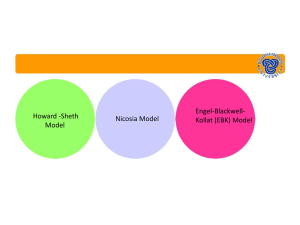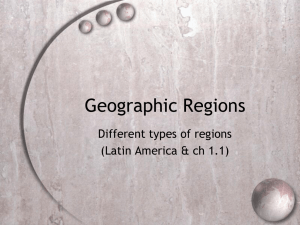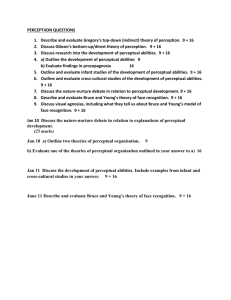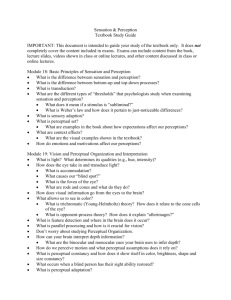Perception, Content and Rationality
advertisement
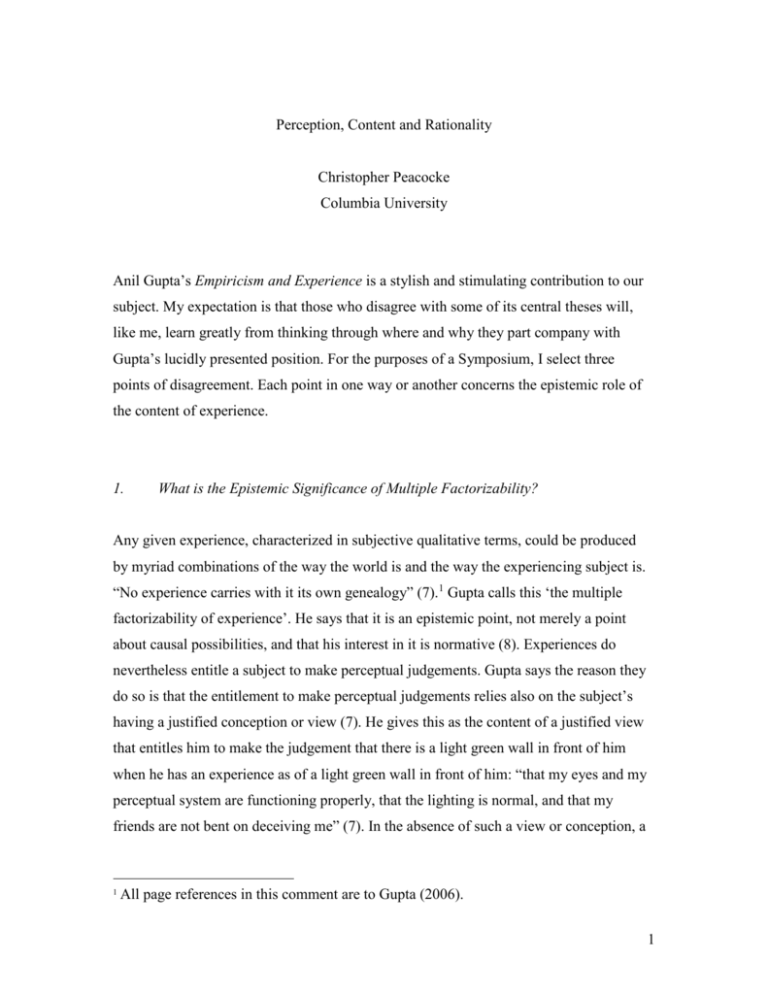
Perception, Content and Rationality Christopher Peacocke Columbia University Anil Gupta’s Empiricism and Experience is a stylish and stimulating contribution to our subject. My expectation is that those who disagree with some of its central theses will, like me, learn greatly from thinking through where and why they part company with Gupta’s lucidly presented position. For the purposes of a Symposium, I select three points of disagreement. Each point in one way or another concerns the epistemic role of the content of experience. 1. What is the Epistemic Significance of Multiple Factorizability? Any given experience, characterized in subjective qualitative terms, could be produced by myriad combinations of the way the world is and the way the experiencing subject is. “No experience carries with it its own genealogy” (7).1 Gupta calls this ‘the multiple factorizability of experience’. He says that it is an epistemic point, not merely a point about causal possibilities, and that his interest in it is normative (8). Experiences do nevertheless entitle a subject to make perceptual judgements. Gupta says the reason they do so is that the entitlement to make perceptual judgements relies also on the subject’s having a justified conception or view (7). He gives this as the content of a justified view that entitles him to make the judgement that there is a light green wall in front of him when he has an experience as of a light green wall in front of him: “that my eyes and my perceptual system are functioning properly, that the lighting is normal, and that my friends are not bent on deceiving me” (7). In the absence of such a view or conception, a 1 All page references in this comment are to Gupta (2006). 1 rational being will be unable to rule out all sorts of bizarre possibilities simply on the basis of an experience with a certain subjective character (8). I have two objections, and one observation on the direction in which the argument is proceeding. (i) A person who has concepts of objects, events, and their properties and relations may perceive states of affairs in the world without having the concept of perception or perceptual experience at all. He may nevertheless be entitled to perceptual judgements made rational by such experiences. This purely world-directed thinker may be a sophisticated reasoner, he may critically reflect on evidence and hypotheses concerning the world. He may be far beyond a primitive level of merely animal representation. Since this person lacks the concept of perceptual experience, his total views will imply nothing about the source of his experiences. I do not think this undermines his entitlement to make perceptual judgements based on his perceptual experiences. If this is so, it seems there must exist some different model of perceptual entitlement than Gupta’s treatment. (ii) Gupta’s discussion does not consider nonconclusive entitlement and nonconclusive justification. If a perceptual experience can give a thinker nonconclusive entitlement to make a perceptual judgement, that is entirely consistent with an experience by itself (or even in the context of background views) not ruling out all sorts of bizarre possibilities. Isn’t nonconclusive entitlement enough to explain some perceptual entitlements? And isn’t nonconclusive entitlement a notion we are going to need to use in many other cases, for example in justified abductive inference? Epistemic conditions that involve “ruling out” all but the entitled content look like a freeway to skepticism in many different areas. Perhaps Gupta thinks that such strong conditions are indeed required, when properly understood (there are McDowellian options here which, since their author is a contributor to this Symposium, are unlikely to be neglected in our discussion). In any case, it would be good to learn more of Gupta’s position on nonconclusive entitlement. (iii) Eventually Gutpa draws the conclusion that the right way to reconcile the rational role of perceptual experience in the formation of perceptual judgements with Multiple Factorizability is to regard the propositional content of experiences as not contributing to that rational role. But there is an existence proof that this cannot be the 2 only way out of the problems he is considering. There is equally an apparent MultipleFactorizability problem for the acquisition of entitled judgements from testimony. Any given utterance can be produced by arbitrary many combinations of intentions of the speaker (deceptive or non-deceptive) on the one hand, and the speaker’s conception of how the world is on the other hand. No such intention-conception pair can be uniquely recovered from the utterance itself, even if we hold its meaning constant. I doubt that many would be tempted to say that the solution to this problem is that the content of utterances should not be conceived as part of the input to ‘the rational cognitive “mechanism”’ that is operative when a thinker forms an entitled belief that p on the basis of testimony involving an utterance that means that p. If the content of an utterance is part of a subject’s rational entitlement for forming a belief on the basis of testimony, then there must be a solution to this similarly-structured problem that reconciles what is right in the considerations underlying Multiple-Factorizability with an entitlement to take some utterances at face value. The perception/testimony parallel is not perfect, for many reasons, but the point about the structure of the space of available solutions to problems of this type stands. Gupta writes “The given, by definition, is supposed to capture the input of an experience to the rational cognitive “mechanism”, and this may well differ from the propositional content associated with the experience” (20). His position does not deny that experiences have content. His position is rather that the propositional content of experiences is not input to the rational cognitive “mechanism”. It is this position, and its analogue for testimony, that I am questioning.2 2. Is Experience Always Reliable? Gutpa says that it is (27-30), and that an experience classified as ‘misleading’ is rather a case of erroneous belief or perceptual judgement based on the experience. “When I have what is called a ‘misleading’ experience, experience has done nothing to mislead me. The I thank Gupta for correspondence that saved me from misrepresenting his position in this area. 2 3 fault, if any, lies with me and my beliefs – beliefs for which I am responsible” (29). I believe this position is false to the phenomenology, to the epistemic status, and to the metaphysics of experience. The content of apparently misleading experiences cannot be attributed to perceptual judgements or beliefs, because in some cases the subject knows he is experiencing an illusion; yet the experience still has the false content. The tour guide in the museum of perfect holograms doesn’t judge that there is a coin on the table when he knows it is a hologram. Yet it still looks to him as if there is a coin on the table. The same goes for many of us in the case of such familiar illusions as the Muller-Lyer. It is a feature that distinguishes genuine perceptual experience from imagining, from mere visual-field sensation (if such there be), and from purer sensations such as pain that in enjoying the perceptual experience, it thereby seems to the subject that the world is a certain way. If experience did not have this property, then whatever one’s background beliefs, there would be no such thing as taking experience at face value: for it would not then have a face value. Perceptual judgement based on experience would then be either an irrational leap in the dark, or something inferential. But in fact it is neither of these two things. In the Section 2C of his book, Gupta develops an argument to the controversial conclusion that acknowledging a propositional content to perceptual experience commits one to a sense-datum theory (see esp. 31-33). The argument of the main text of this section of his book uses the reliability of experience as a premise. Once we reject reliability, that argument lapses. In the footnotes to that section (esp. nn. 27, 28), Gupta says that appeal to reliability can be eliminated. Of an experience e with a content “that K is F”, he writes, “The sort K must be such that the perceptual judgment “that K is F” is rationally forced on the subject when he undergoes e, and also when he undergoes any subjectively identical experience e’” (33, n.28). But if, as I suggested earlier, we should acknowledge nonconclusive justification and entitlement by perceptual experience, it follows that the subject need not be rationally forced to accept the content of experience. This leaves us without any argument that acknowledging a propositional content to perceptual experience commits us also to a sense-datum theory. 4 3. The Link between Rationality and Content Gupta holds that perceptual experience does make a rational contribution to knowledge and experience (19). But, he holds, it is a mistake to think that this contribution is propositional in form. We should, he says, abandon the idea that “the logical function of experience is to provide us with some truths about the world” (55, 57). He holds that the logical contribution of an experience e is rather a function, Γe. The function maps views v to classes of (schematized) judgements Γe(v) as output. A view involves “concepts, conceptions, and beliefs” (76), such as those illustrated earlier in Section 1 of this comment. On Gupta’s position, the rational contribution of experience, in having the status of a function, “is in some respects parallel to that of an argument-form (e.g. modus ponens)” (80). I have two objections, and the first is probably the more fundamental. (i) Content as Required to Elucidate Rationality. It seems to me that the following Ratifiability Condition holds: Whenever a mental transition is rational, there is a condition of soundness that it meets. This soundness condition involves the notion of truth, and it is a condition that concerns the correctness or fulfillment of the contents of one or more of the mental states involved in the transition. Some illustrations of the Ratifiability Condition: A rational transition involving deductive reasoning involves truth-preservation. A rational transition to the judgement ‘I’m in pain’ from being in pain will result in a true judgement. A rational transition to an action of -ing from an intention to now will fulfil the content of that intention. On Gupta’s own view, perception is always reliable (27ff.), so there is a direct connection between rational perceptual judgement and truth too. But even those of us who think 5 perception is not always reliable may endorse a connection between perceptual entitlement and truth in some form such as this There is perceptual entitlement only in circumstances in which it there is no reason to doubt that taking perceptual experience at face value will contribute to the goal of making only true judgements. Under this conception that endorses the Ratifiability Condition, a transition is rational only if it is so ratifiable. On this approach, possession of a content by at least one of the states or events involved in a transition is a necessary condition for that transition in thought to be rational. The case in favour of the Ratifiability Condition can be argued not only exampleby-example, but also from more general considerations. Judgement aims at truth (at least), and action aims at success. The Ratifiability Condition contributes to an explanation of how rational transitions contribute, and not merely per accidens, to these internal goals of judgement and action. On Gupta’s conception, transitions from perceptual experiences to judgements do not meet the Ratifiability Condition as formulated, because they are not conceived as having content at all (either conceptual or nonconceptual). This raises the question: what, for Gupta, is the nature of the distinction between rational and non-rational transitions? I suggest that the apparatus he employs is too thin to have the resources to answer this question adequately. Gupta might reply that the Ratifiability Condition as formulated is simply too strong, and that we can drop its commitment to the presence of content in rational transitions. He may say that a weaker requirement involving truth is still honoured in his conception: if a view v is correct, and an experience e occurs, the judgements in Γe(v) will also be true. But I do not think this last conditional is itself true. It seems to me that even if your background views about the kinds of objects and events in your environment and your relations to them are all true, you may still suffer a hitherto unencountered perceptual illusion, and a judgement based on it will be false. Your belief (or mine, anyway) is not that perception is always reliable. Gupta does in fact endorse the ‘reliability of all experience’ (27); but I cannot see how to reconcile this with the nature 6 and extent of perceptual illusions, in which experiences themselves misrepresent the world. Alternatively, Gupta might say that neither content nor truth needs to be involved in a transition’s being rational. Yet in Gupta’s own example of a function contributing to the rationality of judgement, the case of the argument-form modus ponens, the Ratifiability Condition is met: the form is truth-preserving. What would we think of someone who offers us a form of argument by specifying a function that, applied to premisses, yields certain conclusions, and who also insists that this is a rational transition, but yet offers no explanation of why it is rational? We would rightly be unsatisfied. (Indeed we could describe inductive reasoning by such a function. That would leave the rationality of inductive reasoning still unexplained.) The task for Gupta’s position is to answer this question about rationality without attributing content to experience, and without being involved in implausible claims about reliability. Anyone who accepts the Ratifiability Condition will hold, by contrast, that the possession of content by experiences is inextricably involved with the rationality of transitions in which they participate. This inextricable involvement can be acknowledged whether the content of experience is thought of as conceptual, or is thought of as nonconceptual. It can also be acknowledged on various substantive elaborations of what truth involves, and on various views of whether perceptual entitlement is conclusive or not. The Ratifiability Condition can serve all these comers. (ii) The Need for a Finite Basis The domain of Gupta’s function Γe is infinite. Even if we consider only everyday views about the sort of environment we are in, the sorts of conditions we are in, and everyday concepts, there are arbitrarily many finite sets of such propositions combined with everyday concepts. (This is before we add the views found in Cartesians, Berkeleians, and various other unordinary conceptions that Gupta would also include in the domain.) Suppose we conceive of Γe as a function-in-extension. What is the rule that generates the function-in-extension, in the way that the recursion equations for the addition function generate the function-in-extension for addition? It is compelling that there must be some such rule, or function-in-intension. The rational contribution of experience is something 7 psychologically real; and our minds are finite. We ought to accept the standard reasoning of almost any linguist or cognitive scientist that there must be some finite characterization of the function Γe that allows a finite mind to grasp it. As is familiar from the case of linguistics, this form of argument can get off the ground even if there is a case that Γe is finite but enormous, of a size that requires the recognition of structure in what is psychologically real. On the conception of experience as possessing representational content, of whatever stripe, there is a straightforward solution to this problem. The rule generating the function-in-extension is this: the judgements that are the values of Γe for the argument v are judgements with contents that are also possessed by the experience e, and which the view v makes it reasonable to take at face value (or the judgements are at least determined by those contents). But this answer uses the notion of the content of experience that Gutpa says has no role in making perceptual judgement rational. So it would be good to hear more from him on how he conceives of the function Γe , and the rule that generates it; and if he thinks there is no such generating rule, it would be good to know how the function Γe can be psychologically real or grasped. References Gupta, Anil (2006) Empiricism and Experience New York: Oxford University Press. 8

